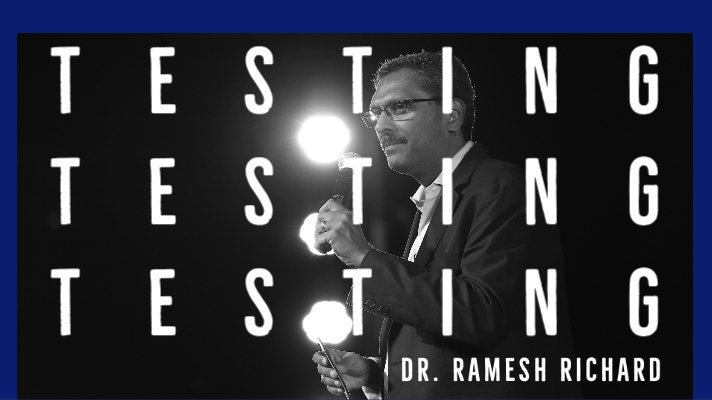
Navigating the Life of a Pastor’s Wife
August 27, 2019
5 Preaching Trends That Will Shape the Future
September 5, 20195 Preaching Trends That Will Shape the Future (PART 1)

In a culture where everything’s changing, so is preaching.
Sure…the message never changes, but the method has to if you want to be effective.
What worked in preaching a decade ago is less effective today, not because the scripture or Gospel has changed, but because the culture has. The fact that 70-80% of all churches are plateaued or declining and the rash of deconversions we’re seeing are evidence that in many cases, what used to be effective isn’t anymore.
This is a post I wrote with Mark Clark, Lead Pastor of Village Church, a church that reaches over 5000 people each weekend in post-Christian, post-modern Vancouver BC.
Mark and I also created The Art of Better Preaching online, on-demand course, which is designed to help you improve your preaching and preach to the church and unchurched effectively, all without compromising the message. (The Art of Better Preaching is available at current pricing for one more day. Tomorrow night, the price goes up.)
Here are some trends in preaching Mark and I are seeing that are helping preachers become more effective.
What worked in preaching a decade ago is less effective today, not because the scripture or Gospel has changed, but because the culture has.CLICK TO TWEET
1. MORE NUANCED THOUGHT, LESS DIATRIBE (CAREY)

It’s never been easier to rant. Nor has it ever been more tempting to lash out at the culture, or defiantly explain why you’re right and everyone else is wrong.
It’s also a deadly mistake. That is if you want to reach unchurched people.
Because the culture is morphing so quickly into deeper post-Christian, post-modern waters than ever, many Christians feel defensive, angry and (honestly) scared. We see culture as the enemy.
If God so loved the world, why do so many preachers behave like he hates it?
Your anger isn’t attracting unchurched people, it’s repulsing them.
What’s better than ranting is nuanced thought and an open mind. Thought that shows you’ve done your research. Done some homework. And openness that suggests you considered the other side and other points of view. And perhaps enough humility to suggest that there are some really good questions people have about Christianity, in the same way, people have questions about life and other worldviews.
I find when I preach and speak in that tone (as I shared in this post) there’s a young, curious, interested audience that wants to hear more.
Most of us, especially younger, unchurched people, are tired of the diatribe, the spin and the angry, entrenched defense.
They want open, honest dialogue, and nuanced thinking.
This doesn’t mean you don’t have convictions. I have very deep, rather orthodox convictions about the Gospel and the Christian faith.
What it does mean is that when you speak, far more people listen.
If God so loved the world, why do so many preachers behave like he hates it? Your anger isn’t attracting unchurched people, it’s repulsing them.CLICK TO TWEET
2. NOT STICKING TO CHRISTIAN THINGS (MARK)
As preachers, we are Christians (we hope), which means we swim in theology, Christian worldviews, actions, lifestyles, politics, etc., – all the time. And if we do that too long we tend to forget what actual people believe (it changes from generation to generation!) and feel and think about and wonder about.
I fundamentally don’t believe sermons are just for Christians, or ‘the church’. Jesus certainly didn’t preach like that, nor did the prophets! Their sermons hit both the religious and the irreligious over and over again. They spoke to people who were believers and who weren’t – and I think we should too.
We should constantly be flowing back and forth in our sermons between
(a) Equipping the saints on the one hand (and not just with conclusions, but taking them a bit along the pathway to how we go there biblically. In other words, teaching them not just what to think but how to think), and
(b) Speaking to the non-Christian, which means engaging their questions, and worldviews at an informed level and in a winsome and persuasive way (I know preacher that sounds like a lot of work, and reading and research! But this is the gig, especially if you want your church to grow with actual non-Christians).
For example, this fall I will be doing a series called Anything Goes at our church. It’s content that got decided by a voting system. Anyone on the internet could ask any question they wanted the church to answer. Nothing was off-limits.
We controlled nothing. Then once all the questions were compiled into categories we got people to vote on the top 15 questions and we would answer the top 7.
I just got the results today and you want to know what the top question is? It’s not gay or transgendered issues, though that is certainly in the top 7. It’s not evil and suffering and evolution, though they are all in there. The top question? “Does the Bible allow for the existence of aliens?”
4,000 people voted over 16,000 votes and that is the top question!
As a Senior Pastor sitting around with your staff coming up with sermon series material I can almost guarantee you the guy who suggested preaching on aliens would be asked to leave the room.
But that, I guess, is what people are wondering about today. So, I have to research it, take it seriously and do my best to preach an informed answer to it. Am I busy leading a staff, writing, having meetings with ministry leaders and people in our church every day? Yes.
Do I have three daughters to raise and a wife to serve? Yes. But this fall I will be doing all that and reading about aliens.
That’s the job. The larger point being, we need to engage the questions, week in and week out, that people in our culture are asking versus only the questions we are asking.
And we need to give those answers from the Bible. People in a post-Christian culture don’t want to be soft sold. They don’t want to be spun to.
They want to know what the Bible says about a thing, even more than what you say about that thing. And that’s good because that is our job anyway.
Preachers, people want to know what the Bible says about a thing, even more than what you say about that thing. And that’s good because that is our job anyway.@markaclarkCLICK TO TWEET

3. THE END OF EASY ANSWERS (CAREY)
Decades ago, the local preacher was essentially the source for everything about the scriptures, Christianity and faith. Sure, an avid Christian might read a few books, listen to other talks or attend a conference.
But information was scarce and cost money. You had to buy a book, attend a conference or order a CD.
That meant that what a preacher said carried a lot of weight, and people by default accepted it.
For too long, preachers got away with easy answers.
Fast forward today, and it could hardly be more different.
Just assume everyone hearing your message, especially non-Christians investigating faith, know as much or more about a subject than you do. And even though they may not, they can easily Google anything you say. And they will.
Don’t get me wrong, there’s a ton of misinformation and bad information online. But that doesn’t stop people from researching.
Add to that the reality that we live in an age of opinions that are strongly held and weakly formed, and the easy assumption that what you say as a preacher will carry to the day is gone.
We live in an age of opinions that are strongly held and weakly formed.CLICK TO TWEET
Post-modernism isn’t the end of answers, it’s the end of easy answers.
It’s also the end of answering questions your audience doesn’t care about. One of the key tasks, as Mark points out in point #2 above, is that wise preachers figure out the questions their audience is asking, and answer that. Admittedly, aliens is a weird one.
But what Mark is doing and what I’ve done many times as well is not just exegete the biblical text, but exegete the audience and culture. The future belongs to preachers who exegete the culture and audience as well as they exegete the text.
It’s the only way you can understand what your audience is thinking.
The future belongs to preachers who exegete the culture and the audience as well as they exegete the text.CLICK TO TWEET


